認知科学・文化心理学 – 「こころを動かされること」についての研究とその方法
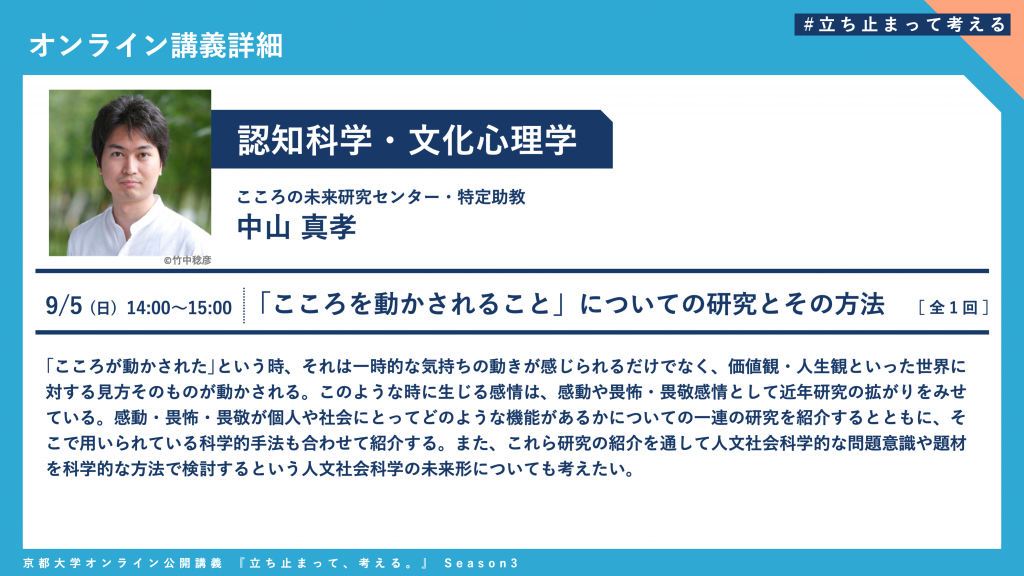
配信日時・URL (ライブ配信終了後もアーカイブでご覧いただけます)
- 2021年9月5日(日)14:00~15:00 https://youtu.be/vb_QBBkbAOo
講義概要
「こころが動かされた」という時、それは一時的な気持ちの動きが感じられるだけでなく、価値観・人生観といった世界に対する見方そのものが動かされる。このような時に生じる感情は、感動や畏怖・畏敬感情として近年研究の拡がりをみせている。感動・畏怖・畏敬が個人や社会にとってどのような機能があるかについての一連の研究を紹介するとともに、そこで用いられている科学的手法も合わせて紹介する。また、これら研究の紹介を通して人文社会科学的な問題意識や題材を科学的な方法で検討するという人文社会科学の未来形についても考えたい。
参考文献
- Bai, Y., Maruskin, L. A., Chen, S., Gordon, A. M., Stellar, J. E., McNeil, G. D., Peng, K., & Keltner, D. (2017). Awe, the diminished self, and collective engagement: Universals and cultural variations in the small self. Journal of Personality and Social Psychology, 113(2), 185–209. https://doi.org/10.1037/pspa0000087
- Keltner, D., & Haidt, J. (2003). Approaching awe, a moral, spiritual, and aesthetic emotion. In Cognition and Emotion (Vol. 17, Issue 2, pp. 297–314). https://doi.org/10.1080/02699930302297
- Maeura, N., Nakayama, M., & Uchida, Y. (2020). The discriminability and commonality between awe and “kando” (being emotionally moved) in Japan. Cognitive Studies: Bulletin of the Japanese Cognitive Science Society, 27(3), 262–279. https://doi.org/10.11225/cs.2020.036
- Maruskin, L. A., Thrash, T. M., & Elliot, A. J. (2012). The chills as a psychological construct: Content universe, factor structure, affective composition, elicitors, trait antecedents, and consequences. Journal of Personality and Social Psychology, 103(1), 135–157. https://doi.org/10.1037/a0028117
- McPhetres, J., & Shtulman, A. (2019). Piloerection is not a reliable physiological correlate of awe. https://doi.org/10.31219/osf.io/72j4w
- Muto, S. (2016). Tokusei sonkei kanren kanjo shakudo (seinenki koki yo) no sakusei no kokoromi [Development of the Trait Respect-Related Emotions Scale for late adolescence]. Japanese Journal of Psychology, 86(6), 566–576. https://doi.org/10.4992/jjpsy.86.15205
- Nakayama, M., Nozaki, Y., Taylor, P. M., Keltner, D., & Uchida, Y. (2020). Individual and cultural differences in predispositions to feel positive and negative aspects of awe. Journal of Cross-Cultural Psychology. https://doi.org/10.1177/0022022120959821
- Nakayama, M., & Uchida, Y. (2020). MEANING OF AWE IN JAPANESE (CON)TEXT: BEYOND FEAR AND RESPECT. PSYCHOLOGIA, 62(1), 46–62. https://doi.org/10.2117/psysoc.2020-B004
- Piff, P. K., Dietze, P., Feinberg, M., Stancato, D. M., & Keltner, D. (2015). Awe, the small self, and prosocial behavior. Journal of Personality and Social Psychology, 108(6), 883–899. https://doi.org/10.1037/pspi0000018
- Shiota, M. N., Keltner, D., & John, O. P. (2006). Positive emotion dispositions differentially associated with Big Five personality and attachment style. The Journal of Positive Psychology, 1(2), 61–71. https://doi.org/10.1080/17439760500510833
- Shiota, M. N., Keltner, D., & Mossman, A. (2007). The nature of awe: Elicitors, appraisals, and effects on self-concept. Cognition and Emotion, 21(5), 944–963. https://doi.org/10.1080/02699930600923668
- Valdesolo, P., Shtulman, A., & Baron, A. S. (2017). Science Is Awe-Some: The Emotional Antecedents of Science Learning. Emotion Review, 9(3), 215–221. https://doi.org/10.1177/1754073916673212
- Yaden, D. B., Kaufman, S. B., Hyde, E., Chirico, A., Gaggioli, A., Zhang, J. W., & Keltner, D. (2019). The development of the Awe Experience Scale (AWE-S): A multifactorial measure for a complex emotion. Journal of Positive Psychology, 14(4), 474–488. https://doi.org/10.1080/17439760.2018.1484940
※ この講義はこころの未来研究センターによるリレー講義「こころの未来を考える」の第3回です。
リレー講義「こころの未来を考える」概要
「こころ」とは何であろうか。洋の東西を問わず数多の哲学者や科学者たちがその解明を試みてきたが、「こころ」は誰もが持っている身近なものでありながら、それを明確に定義することは容易でない。また、近代化や国際化、自然災害や疫病などを通じて環境が劇的に変わっていく中、「こころ」はどうあるべきなのだろうか。本講義では、「こころ」という概念を、認知科学、臨床心理学、文化心理学、美学・芸術学、仏教学など、様々なディシプリンから学際的に考察するとともに、未来社会における「こころ」のあり方について考えていきたい。
講師プロフィール
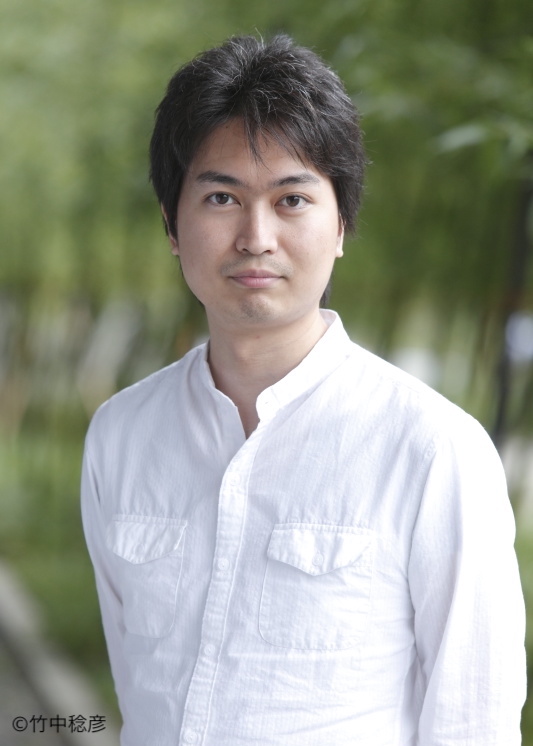
中山真孝 こころの未来研究センター・特定助教
京都大学大学院教育学研究科博士後期課程研究指導認定退学、博士(教育学)。京都大学こころの未来研究センター研究員、カーネギーメロン大学客員博士研究員/日本学術振興会海外特別研究員を経て現職。専門は認知科学・文化心理学。主な論文に「Position-element frequency learning is dissociable from Hebb repetition learning」、「Individual and cultural differences in predispositions to feel positive and negative aspects of awe」、「Aweと意味生成」など。
講義アーカイブ
「こころを動かされること」についての研究とその方法 2021年9月5日(日)14:00~15:00
他のレポートを読む
-
report 2021/07/30
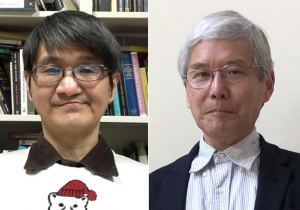
【オンライン公開講義】”立ち止まって、考える” – 科学哲学
立ち止まって、考える -
report 2021/07/30
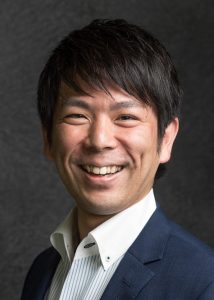
【オンライン公開講義】”立ち止まって、考える” – 仏教学・チベット学・ブータン学 #こころの未来研究センター
立ち止まって、考える -
report 2021/07/30
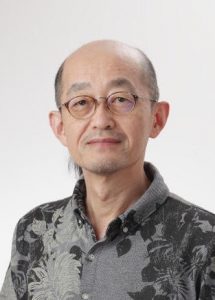
【オンライン公開講義】”立ち止まって、考える” – 美学・芸術学 #こころの未来研究センター
立ち止まって、考える -
report 2021/07/30
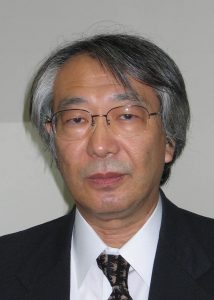
【オンライン公開講義】”立ち止まって、考える” – 現代社会論・社会思想 #こころの未来研究センター
立ち止まって、考える



 人社未来形発信ユニット基金
人社未来形発信ユニット基金